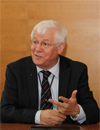 |
||
|
Russia, US Complete Warheads-for-Fuel Program RIA Novosti, PUBLISHED 13.04.2014 The United States has completed payments under a historic agreement providing for the import of Russian highly-enriched uranium for electricity production, Russia’s state-owned uranium producer and trader Techsnabexport said Monday. “We received the final payment from the United States Enrichment Corporation in March,” the company said, adding that its obligations under a contract for low-enriched uranium ended late last year. The Russian supplies have produced 7 trillion kilowatts of energy in the United States since the first shipments arrived in 1998. Russia earned $17 billion under the program, which provided power for one out of ten light bulbs in the United States. Other news: Hungary Enacts Law to Expand Nuclear Power With Russian Aid Hungary’s president has signed a bill into law to expand a nuclear power plant in the country with Russian assistance. Hungary Lawmakers OK Russia Nuclear Plant Deal Russia will provide Hungary a loan of up to 10 billion euros ($13.5 billion) - around 80 percent of construction costs. Russia to Lend Hungary $13.7Bln for Nuclear Plant The deal was announced during a state visit to Moscow by Hungarian Prime Minister Viktor Orban and was hailed by Russian President Vladimir Putin. |
Hero of the day 
We are currently working with the Nuclear Decommissioning Authority (NDA) on this approach, which was submitted in response to their February 2012 call for alternative proposals. We appreciate that the UK is in the early stages of their policy development activities and are pleased to be involved in such important work. INTERVIEW
Yanko Yanev OPINION
Joint Plan of Action |

